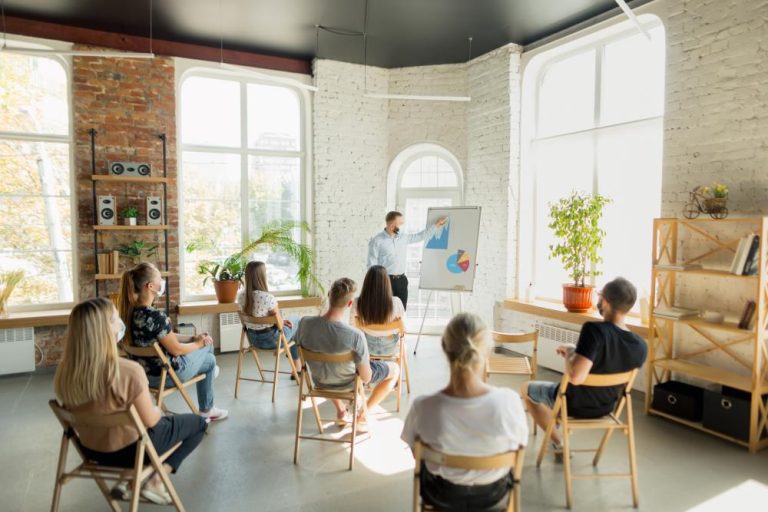The meaning and importance of the workshop in projects
Workshops are an integral part of a successful project process. They can support strategic planning, facilitate effective implementation of tasks, help to move projects forward in case of problems, and help to draw the necessary conclusions to make the team more effective in the future. In this article we will now look at what is the meaning of a workshop in a project context? What is the purpose of a workshop and how can it be effective?

What is a workshop in a project context?
A workshop is an interactive meeting in which a team goes through a series of activities or tasks to solve a problem or plan and develop a project. Workshops are usually led by a trained facilitator.
How is a workshop different from a traditional meeting?
To put it simply, all workshops are meetings, but not all meetings are workshops. Let's look at some of the main differences!
#1. Duration
Workshops usually last longer than meetings. While an average meeting lasts between 30 minutes and two hours, an average workshop can last several hours or even several days. If the focus of a workshop is strategic planning, sometimes the process can take several weeks.
#2. Topic
Meetings are sometimes structured around several topics, usually to inform about acutalities, or to make, review or check certain decisions. Participants are often passive during the meetings. In contrast, workshops require activity, are usually organised to achieve larger scale planning and tangible results, to identify problems.
#3. Moderator neutrality
Meeting leaders are not expected to be neutral. They often form opinions or make decisions.
However, in order to be successful, a workshop leader must make every effort to avoid suggestion and influence. Participants must take ownership of their decisions and opinions. A facilitator risks the success of the workshop by violating neutrality.
How is a seminar different from a workshop?
In a seminar, participants can acquire knowledge and skills through lectures. At the same time, the workshop is based on interaction between group members to support the exchange of knowledge and the development of skills.
What is the purpose of the workshops?
The workshops will provide space for:
- meeting team members, external partners, etc.
- discussing issues
- collecting ideas
- identifying problems
- making decisions
- developing solutions, etc.
The specific medium of the workshop does not exist in the busy schedule of everyday work. It is an interesting fact that professionals spend on average 21.5 hours a week in meetings, leaving little time for in-depth work. Especially when you consider that not all meetings are consecutive, so that meetings break up the day into blocks of 1-2 hours of substantive work.
The workshops provide an opportunity for effective problem solving and help build on the knowledge and wisdom of the team. This is particularly interesting when facing a complex, cross-cutting challenge such as strategic planning.

The meaning of the word workshop in practice: what types are there?
Workshops come in different shapes and sizes. They can be organised for different purposes. They can be small groups, for specific individuals, or events where the whole project team, including external partners, are invited. They can be organised during the planning phase or as an evaluation of the project. Let's look at two example workshops!
Example 1: Strategic planning workshop
What is the focus of the workshop? A strategy is needed to help set priorities and coordinate efforts towards project goals. Identify the milestones to be achieved, the key challenges currently faced and the strategy to overcome them.
What results do we expect from worskhop? A one-page strategy document setting out the focus areas and objectives for the next six months.
Who should take part? Since the strategy concerns the whole project, it is advisable to invite stakeholders from all areas (e.g. sales, product, marketing, etc.).
How does the workshop work? At the beginning of the process, each person is given time to describe the challenges and problems in their area. The challenges are then written on a whiteboard and discussed by the participants. They are then prioritised according to their impact on the project. A list of key challenges for everyone is then drawn up.
In the second phase, the team sets strategic objectives that address the main challenges. These are again discussed and ranked, but this time using an impact-effort matrix that is drawn up for each area. These will be used to formulate precise objectives.
Example 2: Retrospective workshop
What is the focus of the workshop? A strategy is needed to help set priorities and align efforts towards project goals. Identify the milestones to be achieved and the key challenges currently faced, and what strategy can be used to overcome them?
What results do we expect from worskhop? Learn from the past, understand what works and where there are weaknesses, and focus on strengths for better teamwork and future success.
Who should take part? The project team.
How does the workshop work? An illustrative tool for the process is the Rose, Thorn, Bud method:
- Rose = Success, small victory, or something positive that happened
- Spike = A challenge or something that needs more support
- Bud = New ideas that have blossomed, or something that may lead to success in the future
Team members write down their project experiences as described above on small post-its, then share them with the others on a whiteboard. Once all the sticky notes are up, the team groups similar post-its together. Based on a visual grouping of the main problem areas, the team will form 3 groups:
- Let's get started!
- Let's stop!
- Let's continue!
On the basis of these, a brainstorming session is held on how to change processes. These are discussed up to the point where the team agrees on the principles for future work.

What makes a workshop successful?
Workshops often deal with difficult, complex challenges. And with so many people involved, there is always a risk that the event will not produce the desired results. However, there are some good practices that can help you achieve your goals. Let's look at them now!
1. Have a workshop objective
Nothing is more frustrating for a team than not knowing the purpose of a workshop. As a facilitator, you should always be clear about what you expect from a workshop and why it is valuable to the group. This will help to increase engagement.
2. Always have a suitable facilitator
For workshops, it is essential to have someone on board to guide the group through the process and activities. This makes it easier for the team to focus fully on the workshop topic and make meaningful progress.
3. Preparedness is important
The success of a workshop depends on its preparation. The better we understand the challenges, the better we can plan the process. And the better we know each participant's goals and needs, the better we can prepare to prevent conflicts and team members leaving unsatisfied. Planning and preparing workshops is the hardest part of the job. It requires the right expertise and creativity to be really effective.
If you also consider it important to continuously improve your skills for project success and organise successful workshops for even better results, choose from our current training courses for project managers!

 Designabc
Designabc